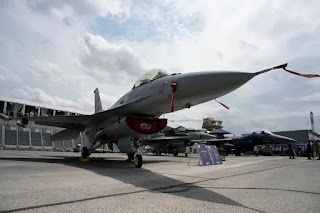Turkey's NATO Developments
Photo source: The National
By Naveed Qazi | Editor, Globe Upfront
Turkey has been sending mixed catch-all messages lately, due to its desire for policy independence. It has long been maintaining a more defensive domestic posture as well.
In a NATO defence ministers summit in June 2023, the Greek and Turkish defence ministers held talks and agreed to cooperate ‘based on good neighbourly relations and friendship’, which is a crucial step forward given the recent bilateral tension.
All this, however, was a little contradictory because President Recep Tayyip Erdogan had before denounced Greek weapons purchases from the US, adding that Ankara’s goal is to ‘contain our adversaries.’ Even before the summit meeting in June 2023, Erdogan visited Nicosia and believed that the resumption of Cyprus talks depended on Europe’s recognition of the Turkish Republic of Northern Cyprus (TRNC), recognised only by Turkey.
In his recent political speeches, the Republic of Cyprus’s President Nikos Christodoulides described Turkey as a ‘spoiler’ and denounced Ankara’s efforts to pressure Europe by enabling migrant crossings. Neither side seems on good terms lately.
Erdogan had also visited Baku to hail close ties with ‘sister nation’ Azerbaijan and back President Ilham Aliyev on the quick completion of the Zangezur Corridor. Armenia, due to its hostile approach, had rejected their vision for a rail line through its territory, though.
In another diplomatic track, Turkish Foreign Minister Hakan Fidan had also met US Ambassador Jeff Flake in Ankara to discuss Turkey's possible approval of Sweden's NATO membership.
Eastern Mediterranean issues might also loom large. NATO defence ministers in a 2023 summit ended with no approval of the alliance’s new regional security plan – its first in nearly four decades. According to David Lepeska’s Oped in The National: ‘One diplomat who attended told a top western news outlet that Turkey had blocked approval out of concern for the wording used for some geographical locations.’
Regional nomenclature has also recently emerged as a bone of contention with Greece. Turkey right now is holding up two NATO confirmations and is hoping for a hint of TRNC acceptance. The nation might be vying for a positive gesture like a mention on a map or in an internal security document.
There are some urgency dynamics getting rolled up as well. Israeli, Greek and Cypriot officials already met in June 2023 in Nicosia to deepen cooperation in trade, tourism, military and energy concerns. It was also a clever diplomatic move by Erdogan to choose Cyprus as his first international destination after re-election, emphasising Ankara’s desire to secure a seat at the table.
At the July 2023 Vilnius summit, NATO still aimed to introduce its new regional security plan and welcome Sweden as its newest member. If that becomes a reality, Turkey might introduce its long-awaited F-16s, a stronger two-state case for Cyprus, and a renewed commitment to the NATO alliance.
There are also chances that NATO could take an alternative path. A prominent British analyst in June 2023 defined how NATO could deny Turkey’s requests, set aside formal admission for Sweden, and instead set up ‘logistical and strategic mechanisms of co-operation’ so that Sweden is made a de facto member of the alliance.
Erdogan had even chatted with European Commission President Ursula von der Leyen, vowing to boost EU-Turkey cooperation. As the lira continued its drastic fall, the appointment of Hafize Gaye Erkan, former managing director at Goldman Sachs, as central bank governor suggested a plan towards a more commonly accepted, West-friendly policy.
For quite a while, Turkey’s state-run TRT and pro-government outlets have also appealed to Erdogan’s conservative base to denounce America’s embrace of its LGBTQ community, part of a broader Pride Month campaign that includes banning parades and other related events.
There’s more to it. David Lepeska further writes: ‘A new TRT series portrays an Osman Kavala-like figure colluding with Americans to overthrow the Turkish government via mass protests. And Ankara last week levied questionable new fraud charges against Istanbul Mayor Ekrem Imamoglu, who now faces up to seven years in prison with municipal elections looming in March.’
As Turkey talks of accommodating Western allies, these strategic moves seem to contradict Europe’s defined liberal democratic values, especially when the Council of Europe has launched infringement proceedings against Turkey for its refusal to release Kavala.
Even as Ankara is in heated talks with NATO allies about approving Sweden’s membership, it reportedly plans to welcome Russian President Vladimir Putin soon. Of course, Ukraine is also overwhelmed in talks to join NATO, possibly through an accelerated timetable.
Turkey has long been a crucial NATO member, covering the alliance’s south-eastern wing, but its geographical proximity and Black Sea access have made it even more important in regional political dynamics as the Russia-Ukraine war has continued. Ankara’s stated reason for opposing Sweden’s membership is that it would like Stockholm to extradite more alleged terrorists and crack down on terror-friendly protests.




Comments
Post a Comment
Advice from the Editor: Please refrain from slander, defamation or any kind of libel in the comments section.